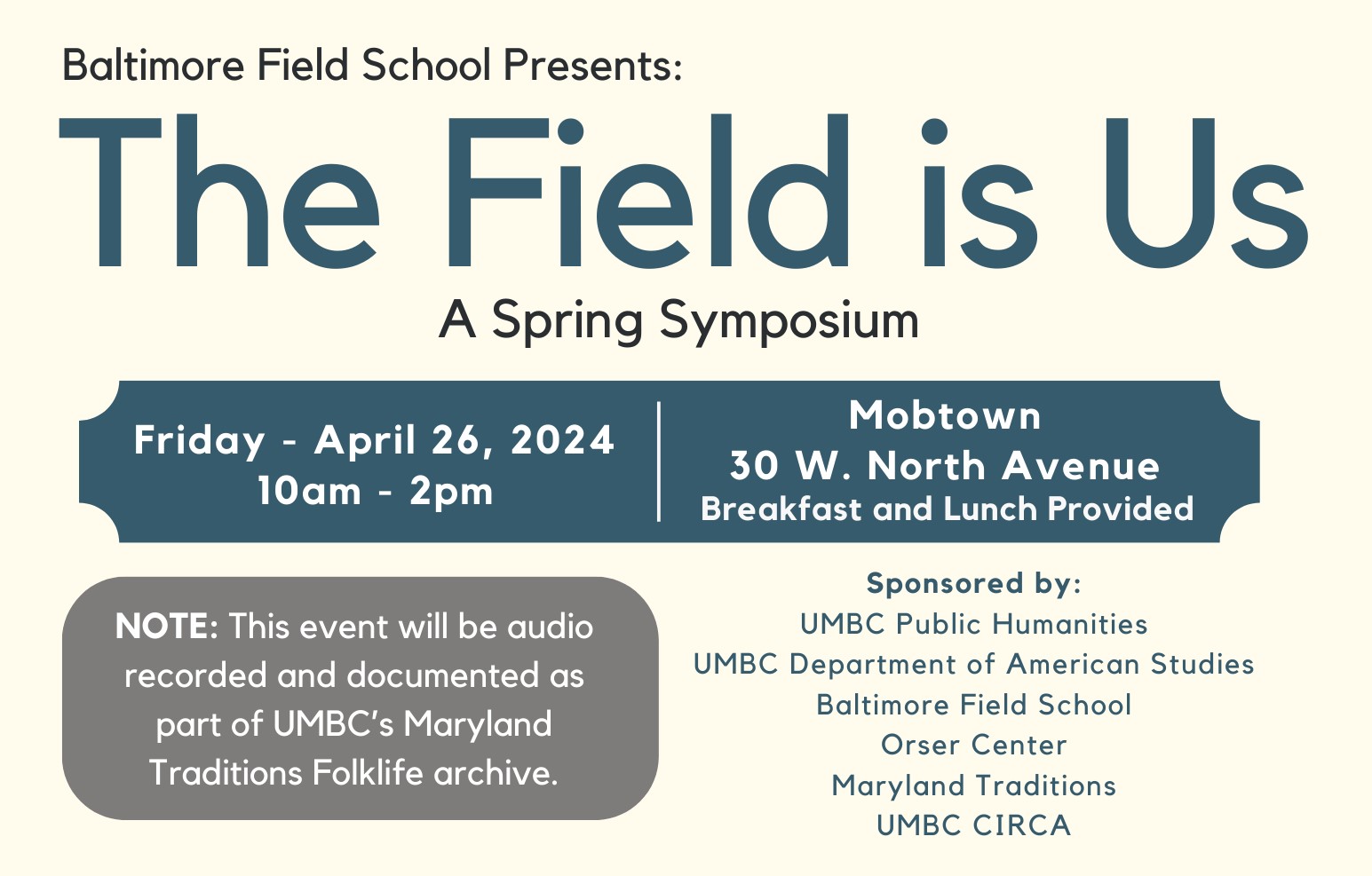Administrative/Biographical Note
 "The Field is Us" Spring Symposium Flyer for the April 2024 event.
"The Field is Us" Spring Symposium Flyer for the April 2024 event.
The Baltimore Field School hosted its "The Field Is Us" Spring Symposium: "Building a Movement: Connecting Housing and Land Justice in Baltimore" on Friday, April 26
2024, at Mobtown, situated at 30 W. North Avenue in Baltimore City. The symposium
explored alternative and more equitable forms of community-led development for historically
disinvested neighborhoods in Baltimore. It brought together publicly engaged scholars
and community organizers to collaborate on advancing initiatives effectively and equitably.
Throughout the event, scholars and activists shared stories and strategies for addressing
Baltimore's history of uneven development, land use issues, and housing inequalities.
Discussions centered on re-envisioning community-led and community-controlled development
through topics such as development without displacement, land trusts, solidarity economics,
and community funds. The event was sponsored by UMBC Public Humanities, Baltimore
Field School, Orser Center, Maryland Traditions, UMBC CIRCA, and UMBC Department of
American Studies. The symposium included a panel discussion in the morning, providing
a platform for in-depth conversations among experts and participants. This was followed
by a lunch break, fostering informal networking and further discussions. In the afternoon,
breakout groups convened to focus on specific topics, encouraging collaborative problem-solving
and idea generation which are documented through the photos. The day concluded with
a final reconvening session, where insights from the breakout groups were shared and
future actions were discussed. Throughout the symposium, key themes emerged, such
as the role of publicly engaged scholars in supporting community-driven initiatives
for housing and land justice. Participants explored meaningful approached that embraced
collective ownership and shared authority, moving away from the traditional extractive
research practices towards more inclusive methodologies. Panel Participants: Nicole
Fabricant, Ph.D., Professor of Anthropology at Towson University Sonia Eaddy, Community
Organizer, Poppleton Now and Organize Poppleton Ash Esposito, Executive Director of
Baltimore Renters United Tisha Guthrie, Community Organizer, Poppleton Now and Baltimore
Renters United Lenora Knowles, Ph.D., Candidate in the Harriet Tubman Department of
Women, Gender, and Sexuality Studies, UMD, and Co-founding member of Village of Love
and Resistance (VOLAR) Meleny Thomas, Ph.D., Executive Director of South Baltimore
Community Land Trust Loraine Arikat, Advocate for the "With Us, For Us" Community
Wealth Fund Nicole King, Ph.D., Associate Professor of American Studies, UMBC Sarah
Fouts, Organizer Peerada Phoomsiri, Student Worker/Program Coordinator "The Field
Is Us" symposium represented a space for rethinking Baltimore's development approaches,
advocating for equitable revitalization of historically marginalized neighborhoods
through community-led approaches It underscored the transformative potential of collaboration
betrween academia and grassroots activism in addressing systemic inequalities and
promoting sustainable urban development practices.
Scope & Content
Arrangement
This collection is unprocessed.
Provenance Information
Provenance and Acquisition Information
Accession MSS2024-07
Processing Note
Digital materials were transferred to Special Collections in May 2024 by Dr. Sarah
Fouts.
Descriptive Rules Used
Describing Archives: a Content Standard (DACS)
Archives Processing Manual: Description (2015): The processing manual used in Special Collections for all descriptive platforms, including
PastPerfect.
Access & Use
Finding Aids
Finding aid is not available.
Access Conditions
Collection is open for research. Please contact Special Collection's staff for access
to digital materials.
Conditions Governing Reproductions and Use
Reproductions allowed for research purposes. Copyright maintained by the creator.